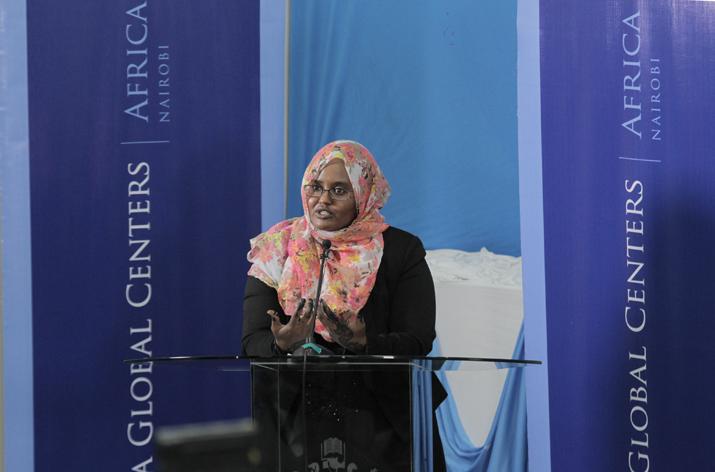A grass-roots NGO run by a family of female doctors has created a haven of peace, health and well-being in the lower Shebelle region of Somalia, despite years of encroaching conflict and war. Amidst a deteriorating security situation and the exodus of the international community, the Dr. Hawa Abdi Foundation (DHAF) provides a model for locally-inspired development that has made a permanent difference in the lives of thousands of Somalis. Columbia Global Centers | Africa was proud to host Dr. Deqo Mohamed, the Foundation’s CEO and daughter of Nobel Peace Prize nominee Dr. Abdi, to present the second in a series of public lectures. Held at the University of Nairobi, Kenya’s leading public institution of higher learning, the lecture brought together over 100 members of the student community, academia, and professionals involved in Somali reconstruction efforts.
What started off as a one room clinic is now a 400 bed-capacity hospital that caters for hundreds of patients a day, and hosts a surrounding village, supported by a school, basic infrastructure, and small farm plots.
“When the government collapsed in 1983, my mother decided to create a small haven around the clinic in the midst of war. The only ‘rent’ was that you left your clan behind. The second requirement was no tolerance for domestic violence,” said Dr. Mohamed, explaining how people from different parts of the country were able to come together and live peacefully.
“There is a generation of Somalis that is lost, due to the war. They have never seen a peaceful Somalia. This is dangerous for the entire world, when you consider that there are 9 million people that know only war and violence – how can you work together as a country to stop the fighting?”
It was partly in answer to this question that the Foundation expanded its activities from the provision of health services to instilling a culture of self-reliance and independence amongst people fleeing the war, via education and training.
“For the last 20 years, people have been relying on food distribution. My mother believed that if we forget how to farm, we will not survive. For sustainability, we need skills and the tools to stand on our own feet.”
The Foundation initiated farming and tree planting in the village, as well as a peanut processing scheme to create the plumpynut formula given to malnourished children at the hospital. The school has grown from 50 to 400 children with trained teachers coming in from nearby Kenya. DHAF also runs a training program for young people aspiring to be doctors.
“I love to train the boys especially,” said Dr. Mohamed, “so that they don’t join the war. We are building a generation of men and women which is self-reliant. A healthy generation, one that can lead Somalia.”
The road has not been an easy one for the family or the community, and challenges remain in the form of conflict and food insecurity. Fuel for the two water pumps is often unavailable, and supplies of essential medicines and other basic goods are frequently interrupted.
An in depth discussion followed the lecture, covering some of the tough issues facing development workers in the country, including the role of women and gender based violence, the security prospects for local and foreign NGO staff and volunteers, and the difficulties of providing healthcare and supplies in war-torn country. Dr. Mohamed also signed copies of her mother’s book, Keeping Hope Alive.
“We are very grateful to Dr Mohamed for agreeing to share with us today, her and her family’s experiences over the past three decades, at a time when Somalia is at a cross-roads,” said Dr. Belay Begashaw, Director of the Columbia Global Centers | Africa. “I think we in the region, and indeed the whole world can’t wait to see Somalia putting the past permanently behind it, and fulfilling the hopes and dreams of its citizens”. The aim of the public lecture series is to promote awareness in Kenya and the region, of some of the best research, ideas and approaches from Columbia University and elsewhere, and, simultaneously to showcase to Columbia University and beyond, the best research, ideas and approaches coming out of Africa, and encourage their discussion and debate.
